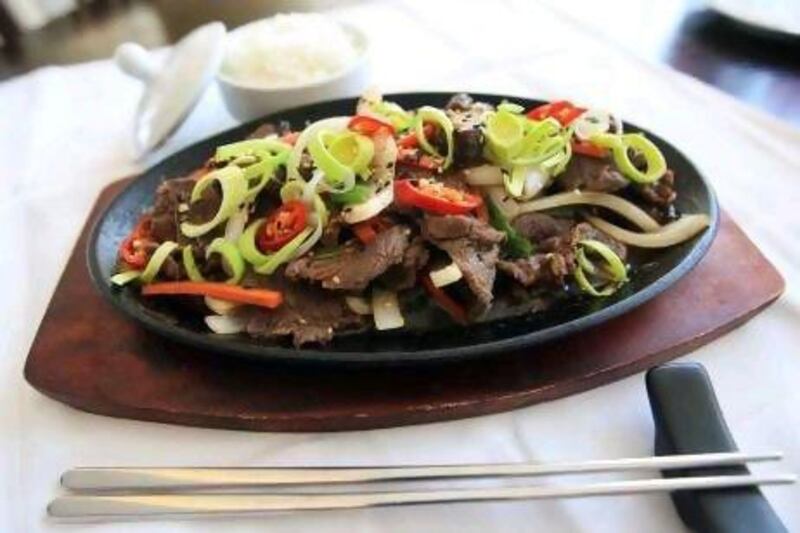To the uninitiated, entering a Korean restaurant for the very first time can feel a touch daunting. What to make of the plumes of smoke emanating from the table-side grills, the whiff of fermented vegetables in the air, or the bubbling, cauldron-like hot-pots brimming with ingredients?
While many of us are less familiar with the fascinating cuisine than we are with food from other Asian countries, thanks to a growing influx of Korean expatriates, change could well be afoot. An article in the Business section of TheNational last week reported that, according to a study by the South Korean Embassy, the number of Koreans living in the UAE is estimated to reach 13,000 in two years. An increase in Korean food and restaurants in the region is inevitable.
Characterised as it is by intense, savoury flavours, as well as plenty of variety and textural contrasts, it's fair to say that for the first-time taster, Korean food might take some getting used to. Suspend any preconceptions you might have about whether heavily fermented, chilled cabbage or salted, dried fish make a welcome addition to the dinner table and you may well be in for a surprise.
Kibum Park was born in Dongducheon, South Korea, and moved to the UAE in December last year. He currently works as a chef at the Holiday Inn Abu Dhabi. "The diversity in the cuisine is what makes it so special," he says. "From healthy, fresh salads to marinated meat grills and stews, the palate experiences very spicy flavours and mild and simple ones. Traditional Korean food always has this variety."
Chongyup Lee, the food and beverage manager at Sonamu restaurant in Deira's Asiana hotel who hails from Seoul, says that this difference should be celebrated. "Unlike any other cuisine, Korean offers lots of different types of side dishes, such as kimchi and namuls, along with the main dishes." Taek Sang Kang, the Korean chef in charge at Sonamu, adds that the purpose of these little dishes, or banchan as they are known, is to bring out the different flavours in a meal and to enhance the more substantial dishes.
All three agree that soy sauce, bean paste and chilli and hot pepper paste are among the most important ingredients in Korean cooking, thanks to the exotic, spicy notes that they add to traditional dishes. "Hot chilli paste [gochujang] is very important. It has to be of a high quality, as the taste of Korean food depends upon this," says Park. They also note that ginger, ginseng, soy beans, kkaesogum (salt with sesame seeds), rice, tofu and garlic are all considered integral.
Should you feel the urge to visit a Korean restaurant in the near future and find yourself fazed when it comes to ordering, bulgogi (thinly sliced, marinated barbecue beef) is often recommend as an ideal introduction to Korean cooking. Other popular dishes include galbi (marinated beef ribs, often served with lettuce and cooked on an in-table grill), bibimbop (steamed white rice topped with a selection of vegetables, meat and egg, with gochujang served on the side) and different varieties of pajeon (Korean pancakes with spring onions, often served as a snack). Remember that all dishes tend to be served at the same time and that items are often cut into bite-sized pieces, eliminating the need for a knife and fork (chopsticks and a spoon for soup is common practice).
If you do decide to recreate the recipes for bulgogi below, and Sonamu's galbi, which you can find on the Bites blog (https://www.thenationalnews.com/bites), both Lee and Kang recommended A-Mart on Sheikh Zayed Road, Dubai, for sourcing authentic ingredients.






